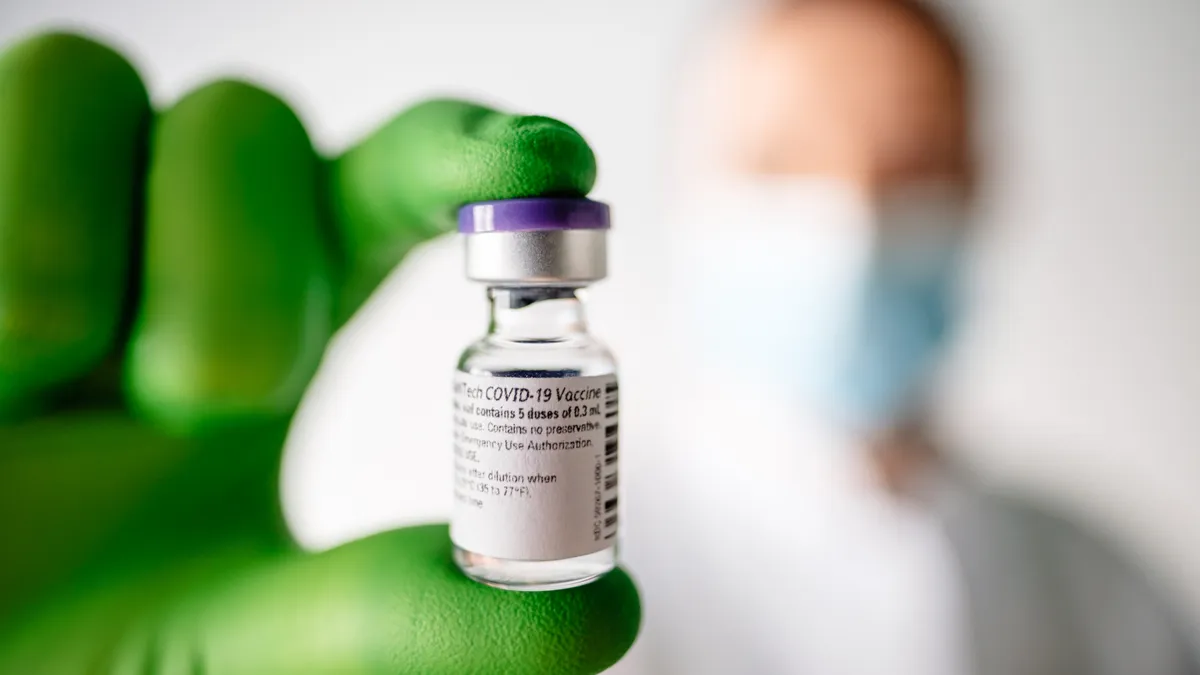Dive Brief:
-
Howard University, a private historically Black college in Washington, D.C., released a public service announcement Wednesday showing its president getting the coronavirus vaccine.
-
Public health and higher education experts said Howard's PSA serves as an example for other colleges hoping to promote the vaccine and other coronavirus prevention measures.
-
The university joins a handful of HBCUs whose leaders have gotten the shots to encourage others to do the same once they can. And some higher education institutions are holding information sessions and helping administer the vaccine to surrounding communities.
Dive Insight:
Although most college students are in the back of the line for the coronavirus vaccine, schools should begin educating them about why getting the shots is important, said Anita Barkin, co-chair of the American College Health Association's COVID-19 task force.
Howard's PSA featured several healthcare workers sharing why they're getting vaccinated and showed the president receiving his shot. It also encouraged students to continue social distancing and wearing masks while they wait for their doses.
In a new public service announcement, President Frederick (@HUPrez17) takes his coronavirus vaccine shot while encouraging members of the community to do the same when their time comes! Read more about the PSA here: https://t.co/Xywr3Vhmvr pic.twitter.com/84x19pTM1e
— Howard University (@HowardU) January 6, 2021
Those elements hit the mark, Barkin said. "It's very important that there is honesty and transparency and that the behaviors you expect others to follow are the behaviors you endorse yourself," she said.
Howard President Wayne Frederick participated in the PSA to encourage Black people in America to get vaccinated, according to a university news release. Long-standing racism in healthcare and past abuses in medical research have made some members of this community wary of the vaccine, but a successful public health campaign hinges on gaining their trust, experts say.
The National Academy of Medicine has called on the Centers for Disease Control and Prevention to partner with HBCUs and other minority-serving institutions to promote the vaccine among Black, Hispanic/Latinx and Indigenous communities, and others who may be skeptical of the shots.
"Black communities have had a very touchy relationship with the medical community in the U.S.," said Felecia Commodore, a higher education professor at Old Dominion University, in Virginia. HBCU presidents are tasked with being sensitive to that history and how the pandemic is affecting Black people, she said.
The coronavirus is killing Black or African American, American Indian or Alaska Native, and Hispanic or Latino people at a higher rate than it is White and Asian people, according to the COVID Tracking Project.
With their ties to Black communities, HBCUs can serve as a trusted source of information about the vaccine, including by holding informational sessions with Black doctors and scientists, Commodore said.
Other HBCU leaders have also been publicly involved with the vaccine development and distribution process.
The medical school dean at Morehouse College, an HBCU in Georgia, was inoculated in a video broadcast by CNN to help build confidence in the vaccine. The president of Hampton University, an HBCU in Virginia, did the same on a Facebook livestream.
And at least two HBCU leaders participated in the vaccine trials. Walter Kimbrough, president of Dillard University, in Louisiana, said he joined a phase-three trial after reading news reports that the vaccine was being developed without a significant number of African Americans.
"They are trying to demystify the vaccine process," said Marybeth Gasman, executive director of Rutgers University's Center for Minority Serving Institutions.
Some schools are holding informational sessions about the vaccine. Emory University, in Georgia, hosted a virtual town hall in December to answer questions about its safety and efficacy. Tulane University's medical school, in Louisiana, organized a similar online event the same month.
Colleges should also tap students to help with vaccine education. "Students can tell us what's going to resonate with their population," Barkin said.














